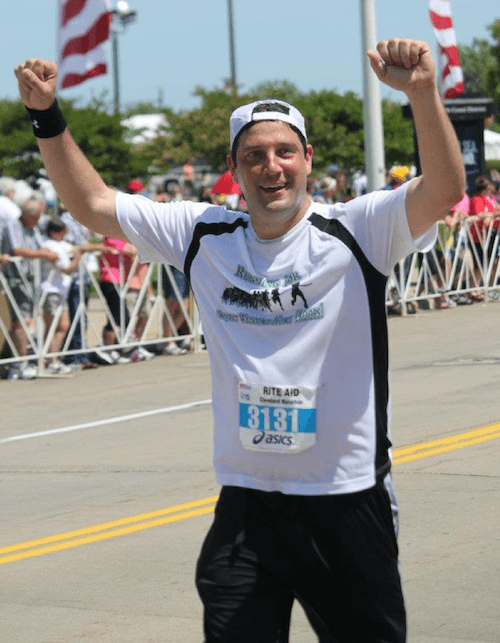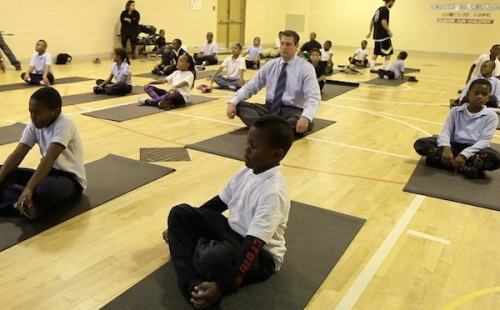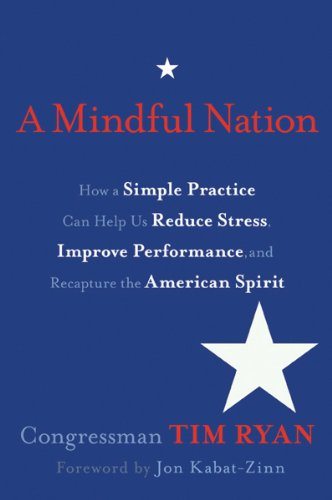5 questions for Tim Ryan, the Congressman who meditates
The Ohio Democrat uses mindfulness to manage life in Washington. And he wants to bring it, and other wellness practices, to citizens around the country.
When Congressman Tim Ryan first took office to represent Ohio’s 13th District in the United States House of Representatives, he was just 29 years old. Twelve years later, he’s been reelected five times.
Which is to say he’s probably been pretty busy, and, you know, stressed. (We hear DC can cause headaches?) Except that he’s got a secret: meditation.
Ryan, the author of A Mindful Nation, uses the practice to keep himself centered and is now helping to bring it—along with a wider array of wellness practices—to his constituents and citizens around the country. Mindfulness, he says, can help veterans with mental health issues, children in under-performing schools, and contribute to creating a healthier country, overall. Oh, and make you a feel like a more calm, cool, and collected person.
We spoke with the charismatic Congressman to find out more:

1. Tell me about your personal meditation practice. I usually meditate every morning for anywhere between 30 and 45 minutes. I do an awareness practice, sitting on a cushion or chair and really working on basically being aware of my thoughts and trying to follow my breathing. Really trying to ground myself in the present moment is the technique and to just get some space between my thoughts instead of really clinging to them and believing all of them.
2. That’s a big chunk of time. Is it hard to fit in with a Congressman’s schedule? Yes, sometimes. Whether it’s being in DC or being home with my stepkids and dogs and my wife is pregnant…well, things can be very hectic. But it’s really something that keeps me sane through all of the craziness. And given how much stress can accumulate, I really need it to just be able to get through the day with some sanity.
3. It makes sense that you’d need something to help manage the stress of the job. How else has your practice and interest in mindfulness affected your work? I think you’re a lot more productive if you’re not stressed out. And politics, like so many other businesses, is people-centered, and it helps my interactions with others to come from a better place, not a place of anger or fear but really trying to see the best in people. Also, with wanting to accomplish things, and how we can best do it given the lay of the land politically—it can get frustrating, and frustration can make things worse. It’s helped me be a little more productive and constructive. It’s not always easy, and I’m not here to say I do it all the time because I don’t. But I think I do it a little better now because of my practice. It’s also really got me focused on how this and other practices in integrative health can really help the country.
4. That’s really interesting. I know you’ve introduced a bill that would help veterans using some of those practices. Is that one of the ways you mean? And are there others? Yeah, I think the two things that are most immediate for me are one, the veterans, because we have 22 suicides a day among our veterans and that to me is a total black mark on our society that we’re allowing that to happen. And I think we have found these techniques to be extremely helpful and low-cost. Meditation is one piece of a broader field, whether its acupuncture, maybe it’s TM [Transcendental Meditation], yoga, who cares what it is—if it’s helping veterans, let’s get it out to them.
The other is the education piece. We’ve got kids who are constantly distracted and bombarded with commercials and information and text messages and all kinds of things. And we’d better give them the skill sets that they need to really go out into the world and be able to hold their center, and be able to focus and concentrate at a level where they can set goals for life and then be able to achieve them.
5. But how do you convince people that meditation and other alternative health practices aren’t “out there,” that there’s real science behind their effectiveness? We are trying to, and we are opening minds to it because of the people that are into it. So, for example, we have Keith Mitchell, a pro football player from the New Orleans’ Saints. He led a staff meditation a couple of weeks ago on Capitol Hill. We’ve had veterans come in and lead mindfulness meditations. One yesterday was a marine who served in Fallujah. By presenting it in a way that shows either the science or shows that these big, manly men are doing this practice because it’s helped them, we’re starting to really reduce the barriers and improve the image of what mindfulness really is. —Lisa Elaine Held
For more information, visit www.timryan.house.gov












